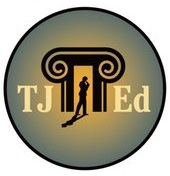Please click on a title to skip to the article you want; or, simply scroll down the page to view them all in order.
Featured Article:
 Does Force Equal Rigor?
Does Force Equal Rigor?
by Oliver DeMille
Introduction
Every once in a while somebody asks me why TJEd recommends such lenient academics for children under age 12 and such rigorous standards for youth ages 12-18. This seems so different from the national system most of us experienced.
 Sometimes my first instinct is to defend this point, to say that of course young adults should study much more deeply and broadly than little children, and that the way we tend to emphasize homework in grade school and then playful activities in high schools seems backwards. Various studies have shown how damaging this is to some children—especially boys. Researcher Paul Price collected much of this compelling and disturbing data in his book Childhood Dying.* Writings by Maria Montessori also deal very effectively with this topic.
Sometimes my first instinct is to defend this point, to say that of course young adults should study much more deeply and broadly than little children, and that the way we tend to emphasize homework in grade school and then playful activities in high schools seems backwards. Various studies have shown how damaging this is to some children—especially boys. Researcher Paul Price collected much of this compelling and disturbing data in his book Childhood Dying.* Writings by Maria Montessori also deal very effectively with this topic.
I think you can make a real case for this: We tend to push small children to the point that many of them really dislike learning before they are ten or eleven years old, and the American teenager is notoriously lax about education.
But in reality, lax education for children and rigor for youth isn’t what TJEd promotes. The whole conversation is based on a false assumption. In short, TJEd does not teach lenient academics for children. Let me repeat that: TJEd idealizes a higher standard of education among youth, yes; but it does not urge “lax standards” for children. No doubt the misunderstanding exists mainly because of semantics; but I believe the distinction matters, and impacts the way the principles of Leadership Education are applied.
I. Inspiring Teaching is More Challenging than Requirements
One of the great keys of truly excellent education is to “Inspire.” As parents or educators seek to inspire, they rightly look for ways to avoid compulsion, manipulation, requiring. And yet, all too often in our modern minds we tend to process this phrase more as, “Ignore, not Require.” This has been a major theme we have tried to address in seminars training people to apply TJEd. Our message is not, emphatically not, that parents and teachers should “ignore” any of their students, or their academics. Indeed, we teach exactly the opposite.
Consider this more deeply. What takes more effort for the parent or teacher: to ignore or to require? The obvious answer is that ignoring is easier. Immoral, but easier.
But here is the real question: Which takes more effort for the parent or teacher: to inspire or to require? In truth, inspiration is a lot more challenging. It takes preparation, planning, implementation and continual improvement of one’s educational delivery—a rigorous approach, indeed. And it should be obvious, but bears saying:
Force does not equal rigor.
TJEd is all about inspiring each student, about making education truly exciting and enticing for each individual learner. This is a challenging proposition, and the parents/teachers who do it typically spend at least as much time per student preparing and delivering educational experiences as public educators. The thrust of their effort looks considerably different at different phases of development and for different children.
As for the student: she ends up experiencing at least as many educational opportunities, projects, and practices as students in the “require” models of schooling—indeed, many would argue that Leadership Education is a considerably deeper and richer experience.
In short, TJEd does not promote lax education for children and then rigor for young adults. It does the latter—rigorous study for those 12 and above—and it also promotes a well-delivered and principle-based educational experience targeted to each individual child younger than 12.
II. Different is Good
 Many people in our modern world have come to equate conveyor-belt methods and systems with “schooling,” and they tend to see anything else as lenient or non-academic. TJEd is different than the conveyor belt model; but it is not deficient, or lax. Like Montessori, TJEd emphasizes an educationally-rich environment complete with a caring adult who relies on setting the example, engaging each child individually, and not requiring every child to learn identically or fit into a pre-established system.
Many people in our modern world have come to equate conveyor-belt methods and systems with “schooling,” and they tend to see anything else as lenient or non-academic. TJEd is different than the conveyor belt model; but it is not deficient, or lax. Like Montessori, TJEd emphasizes an educationally-rich environment complete with a caring adult who relies on setting the example, engaging each child individually, and not requiring every child to learn identically or fit into a pre-established system.
We have taught that the Phases of Learning could be summarized as:
- Inspired and Principle-based Unschooling (not to be confused with “not-schooling” or ignoring) in the earliest years (Core Phase)
- Montessori-ish and Charlotte Mason-style education in pre-adolescence (Love of Learning)
- Progressively rigorous liberal arts following the child’s own motivation (and this actually works, when the foundation is laid for them to transition from Love of Learning to Love of Study.Really!)
TJEd does hold that children who are manipulated or coerced academically while young very often learn to dislike learning, hate school, and avoid whatever assignments they can. The result of such learning is a nation of students who do the bare minimum whenever possible, or, at best, do their school work in order to impress adults and get good grades (read: get it over with so you can get on with the rest of your life, free of learning requirements) rather than from an innate love of learning.
But in saying that we should not “push” young children too much academically, we are not suggesting that young students should be left without a considered approach to their optimal progress and learning. TJEd teaches that parents and teachers of children must work very hard/smart to:
- Show each student, by example, how exciting and valuable learning can be
- Brainstorm ways to invite students to engage individually considered new topics without using manipulation or force
- Discover each child’s learning style(s) and build learning around these strengths, especially in early years
- Help each child fall even more in love with learning, studying, reading, math, science and the other key subjects and great ideas and skills of humanity
If much has been said about laying off the little ones, it is because most of us are so entrenched in the conveyor-belt experience that was our own education that we are inclined to err on the side of force and manipulation. The habits and social norms that influence our choices seem to pull us toward the manipulative, compulsion-driven models that seem “normal” in our day and age. Even those who profess TJEd as their chosen philosophy and methodology lament how difficult it is to get off the conveyor belt and really engage the process at the optimal level of each child.
But those who do a fair job of it find that their youth step up to the opportunity! Once young adults approach/enter puberty:
- They are capable of abstract reasoning
- They are ready for a rigorous study habits
- They thrive in an environment of commitments and accountability (even when it’s not “fun”)
- Methods and objectives accordingly transition to optimize their young-adult learning
And interestingly enough, Montessori taught this all along.
To sum up: Children are different than adults, and certain modes of learning are more ideal for children than the prevailing force-based “requirement” model.
III. Personalized and Individualized Education
TJEd discourages herding our children into populations of same-age students and then forcing and requiring them to do the same things and learn in the same ways—without regard for their interests, aptitudes, developmental readiness, gender, or family dynamics (oldest siblings often learn differently than middle siblings; youngest siblings often have an experiential edge; parental education and style figure in; and so forth).
This typically shuts down learning with at least some, and often most, of the students. TJEd is based on the idea that each and every student can get a great education and that, especially in childhood, teachers should personalize, individualize and focus on lighting the fire in the individual student to passionately pursue a great education—rather than on forced requirements.
TJEd teaches that in Core Phase (commonly ages 0-8 in healthy children on a typical developmental trajectory) the most important lessons to teach children include the following:
- Right and wrong
- Good and bad
- True and false; relationships
- Family values, especially spiritual culture
- Family identity, including family history and shared mission
- Family routines and responsibilities
- Accountability
- The value and love of work and play
TJEd encourages parents to frequently (daily or more often) read aloud to children at this age, to expose them to a rich environment that includes principles and play with math, science, language(s), social studies, etc., and using art, work and play to teach and reinforce important knowledge and lessons. A supportive, play-to-learn environment strong on moral and personal development is ideal for the Core Phase. Some of the ideas and methods of “Unschooling,” Charlotte Mason and Montessori are a good fit for many children in Core Phase.
Parents and teachers of children in what TJEd calls the Love of Learning Phase (aged 8-12-ish, typically), are encouraged to help children begin to discover a wide variety of topics and information, using projects for creative and experiential learning, and to develop, practice and use skills and tools in all academic topics including language, mathematics, science, history, social studies, library research, public speaking, writing, etc.
They are urged to set aside a certain amount of time each day for the children to engage with these things. Again: Charlotte Mason and Maria Montessori are two “styles” of application of these principles that many TJEd practitioners recur to to inform their approach. Numerous suggestions on how to make this work effectively both in classroom and non-class environments are given in Core and Love of Learning: A Recipe for Success (available as a major section of Leadership Education: The Phases of Learning and as an audio presentation of seminar highlights).
In many ways TJEd is like other systems of education. A major difference is that TJEd teaches parents/teachers to personalize and individualize around the developmental age, styles, strengths and weaknesses of each student.
IV. Where the Rigor Comes In
In order to inspire quality, personalized education for each child, TJEd recommends the following (more particularly for older students):
- Hold a weekly parents’ or teachers’ meeting where the strengths, weaknesses, performance and needs of each student are considered.
- Develop a plan for helping each student in the coming week (and, where needed, month or term).
- Schedule and plan weekly how to deliver the personal plan for each student, and involve those who need to be included in the plan.
- Meet individually with each student every week and discuss the personal plan. This may be formal or casual, depending on the Phase and needs of the individual child and the optimal style and approach of the mentor/parent.
- Allow the student to have real say in the plan.
- Focus on inspiring each student to voluntarily seek what she needs, instead of using bureaucracy, manipulation or requirement to force her.
- Hold daily adult-led “classes” (“kidschool,” “momschool,” co-ops, commonwealth, online instruction, etc.*) and give personalized support, help and feedback to each student as she pursues her educational plan. This can include lectures, projects, discussions, presentations, music or art instruction, scientific experiments, hands-on mathematical projects, spelling bees, times tables, penmanship projects, punctuality, good grooming, etc. (All of these are covered in the TJEd books.)
- Be creative in getting each child truly excited about the topics covered. Be open to ideas and activities that can bring interest and excitement. As the process unfolds, trust that the interested and engaged student will have personal inspiration to help the mentor orient goals and inform the optimal approach.
- Hold a big annual project such as a play, concert, fundraising drive for a favorite charity, or other big event that catches the students’ imagination and motivates them toward excellence.
- Model personal study such that the students know that self-education is a value not just for the kids, but for the parents and mentors. Lead by example as you study, research, annotate, write, share and interact with others (in book clubs, social networks, blogs, etc.) about the things you are learning. Show them how it is done, and share with them ideas from what you are learning.
- Encourage each child (typically Love of Learning and older) to be part of a club such as scouting, sports, service clubs, etc., to help teach teamwork and leadership and to utilize positive peer interaction to reinforce learning goals and study habits, spark interest in new topics and projects, and inspire greater effort and standards of excellence.
- Plan and run high-quality field trips on a regular basis. These are especially effective when a segment of learning precedes the field trip and inspires each student to get the most out of the on-site experience.
- Take frequent library trips with age-appropriate and personalized objectives (introduction and fun; discovery and exploration; expanding awareness of topics to study; writing and research projects, etc.).
- Use the computer in age-appropriate ways, and facilitate tech-literacy—including online instruction, tech-based learning tools, social networking for learning and connections, financial and entrepreneurial applications, etc.
- Read valued classics to and/or with each child, giving her a background in the language of the classics and a repertoire of great ideas and cultural references.
- Anchor or discuss the ideas from these readings in age-optimal ways that help each child consider and think about important themes and ideas.
- Brainstorm and plan individualized, Phase-optimal assignments for each student that are well-designed to help the student progress. Sometimes focus on expanding a student’s strength and other times help her stretch by taking on an area of weakness. Closely tutor and mentor each student on each assignment.
- Carefully plan a subscription or two for each student (magazine or online—and some titles may be shared among more than one student), designed to help her progress in some area of interest or need. Interact with the student on the subscription by listening, talking about it and at times going through it together.
These are just a few of the systems taught in just one TJEd book. Everything in this section is covered in much more detail in the book Leadership Education, pages 1-189, which is targeted to students under age 12.
V. Two Points of Reference
The rest of the above-named book (after page 190) is designed for students 12 and over (or more specifically, for students in Scholar Phase and those transitioning to Scholar Phase; ages can vary considerably, and we prefer to anchor the topics by Phase than by chronology).
Students who reach this quasi-adult stage of adolescence with a strong Core and a passionate Love of Learning are eager and hungry for responsibility, experiences that will help them define their identity and purpose, and preparation to achieve something great with their lives. They thrive with wholesome and uplifting peer interactions, meaningful mentoring with individual accountability, and expanding their experience with the world by coming face to face with greatness in the great classics of mankind.
From the outside looking in it can feel like the early years are without rigor, and the later years are without fun. Actually, rigor and fun exist in both stages. The emphasis in the early years is on rigor in the parents’ education, and rigor in doing the hard work to provide an optimal environment and personalized program of Core and Love of Learning for the budding scholars. And fun exists in the later years as youth feel the exhilaration of becoming, the sense of accomplishment that is inherent in doing hard things that matter, and earning self-respect and the esteem of worthy peers and mentors.
The tone of counsel to parents in the TJEd model is couched in the concept of, “work hard in the early years so your 12-year-olds love studying as much as ice cream—rather than hate study and try to do as little of it as possible. This kind of to love math or history can be a lot of work for mentors, but it is worth it.” This is also the theme of TJEd training seminars for parents/teachers of students ages 0-12.
In contrast, the tone of youth seminars for those 13 and above could be summed up as:
- You have important things to accomplish in your life, and you need a world-class education.
- Push yourselves a lot harder! Work, work, work!
- What you have to contribute is unique and world-altering.
- A great education is a fabulous thing, and it is up to you to go earn one!
- Study, study, prepare! The world needs what you were born to do.
- Learn more about the areas that interest you, and dig so much deeper into the areas that haven’t yet excited you. You just haven’t learned enough about them yet.
- All knowledge is so fun. Study a lot more! How exciting!
VI. Who Says?
Top current research books which promote a TJEd-type approach to education include:
- The Global Achievement Gap by Tony Wagner
- A Whole New Mind by former Al Gore speechwriter Daniel Pink
- Five Minds for the Future by Harvard’s Howard Gardner
- Revolutionary Wealth by Alvin Toffler, the author of FutureShock
- The World Is Flat by New York Times writer Thomas L. Friedman
- Disrupting Class: How Disruptive Innovation Will Change the Way the World Learns, by Harvard’s Clayton Christensen
On a more classical note, TJEd parents/teachers are encouraged to study the educational writings of:
- Erik Erickson
- Jean Piaget
- Maria Montessori
- The late Jacques Barzun of Columbia University
- The great American educator Mortimer Adler
Conclusion
TJEd promotes individualized, personalized, mentored education for each child 12 and under (and above), an education designed for the specific child under the direction of a dedicated and caring mentor, an education that is reviewed and improved upon each week. Such education could hardly be less “lax.” It is dedicated to inspiring each student, rather than forcing her; but this makes it more, not less, challenging and effective.
As a people, we moderns need to get past the mistake of equating rigor with force and excellence with conformity. In a global economy where innovation is king, we need this different perspective more than ever or we will likely see high unemployment rates remain for decades to come while our freedoms and opportunities decrease.
In an increasingly competitive world, our educational system simply must teach initiative, innovation, creativity, independent thinking and ingenuity along with knowledge and skills. The key to these are the same principles which drive TJEd: mentors who personalize, individualize, constantly analyze and consistently improve the education of each student, in harmony with the Phase and mission of the individual. Such a model of education is challenging for parents and teachers, but our children are worth it.
For more background on the science behind TJEd, read: “The Chemistry of Genius?”.

